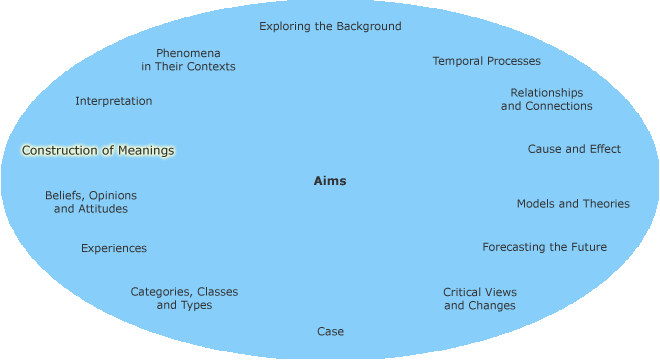Construction of Meanings
Humanistic research typically argues that the researched phenomenon contains diverse meanings in different situations and environments. Humanistic research holds that meanings of phenomena often are linguistically constructed: meanings do not exist a priori, but are being produced linguistically in social and cultural interactions. Research conducted from this kind of starting point aims to identify and explain the various meanings of phenomena. The depth of the focus of the research lies in the degree of the definitions and explanations of the diverse meaning-making processes.
Strategies
Research aiming to analyse construction of meanings by exploring concrete materials such as documents, interviews, images or objects can be defined as empirical research. Qualitative research is the norm.
A case study enables you to research the construction of meanings by focusing on either a particular or small group of research objects or a larger group of phenomena. You can also use other research strategies (discursive approaches and narrative research).
Data Collection
When your research aim is to analyze the construction of meanings, you can use different types of data collected by a variety of methods. You can use either data collected for previous research by another researcher (existing concrete materials) or collect / produce your own data during the research process. You need to be aware that an essential factor in the data collection process is that the data must enable the constructive analysis of the materials.
You can use a variety of research strategies: Population research is suitable when the quantity of available data on a phenomenon is small. Sampling is suitable when the quantity of available data on a phenomenon is too large for you to analyse all of it. Random sampling enables you to select a small element without bias. Purposive sampling (goal-directed sampling) enables you to select samples that match the aim of the study.
You can collect data for discoursive approach and narrative research through interviews, questionnaires (which include open questions) or collecting different kinds of texts or narratives, as well as from various archival materials.
Data Analysis
Qualitative analysis methods are suitable for research of the construction of meanings.
Discourse analysis is the most suitable for exploring linguistic construction and interaction.
Other suitable qualitative analysis methods are: narrative analysis, conversation analysis and phenomenographical analysis.
Philosophies in Science
Qualitative analysis methods in the humanities are based on interpretivism. Views emphasising interpretation in the formation of meanings and subjectivity in meaning-making processes, obey the idea of relativism.
Discourse analysis may be based on constructivism.
Conversation analysis may be based on constructivism.
Narrative analysis may be based on constructivism.

